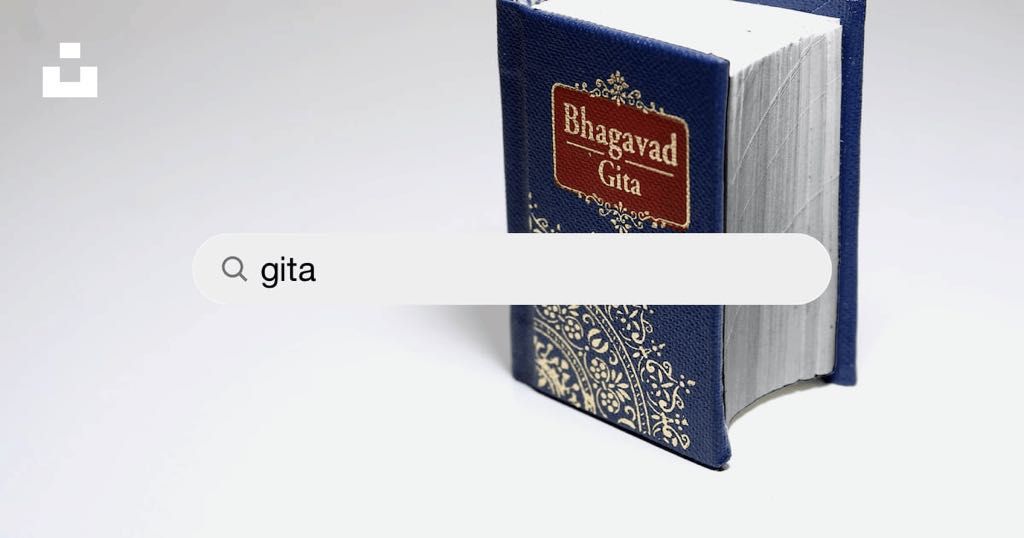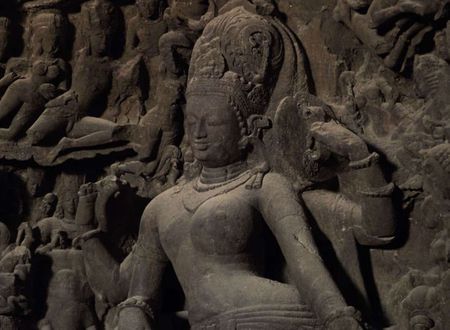Swami Ji narrated many anecdotes and happenings from his life during the Sri Suktam sadhana. Reading Shreemad Bhagavat Gita was one of the things Swami Ji told us that was essential to me.
Swami ji stated, “I used to reflect about verses of Shreemad Bhagavat Gita after I finished my meditation session.”
This was motivating for me, and I included it into my morning meditation routine. It is extremely useful to contemplate on Lord’s verse after a lengthy meditation session when we become more attuned.
Because the Lord always operates at a supreme level of consciousness, and meditation raises our level of consciousness to some extent. As a result, we become more receptive to what the Lord has to say.
Veda vyasa had stated that the words of the greatest Lord, Bhagavat Gita, are sufficient to cross this ocean of existence. So why go anywhere else?
I once read a very beautiful line from Srimad Bhagavad Gita and the next day while I was taking an early morning bath, I was much more thrilled to read what Sri Krishna had to say (even more than My meditation itself). Such is the interest Srimad Bhagavad Gita can create if you include daily reading of it in your post meditation session.
The question now is, which Shrimad Bhagavat Gita should we read?
Should we read with Guru’s commentary?
Is it better to read in English or Hindi?
Here’s the solution:
When I was listening to Swami Ji’s Commentary on Srimad Bhagavad Gita on audible, he remarked that I never read any guru’s Commentary on Bhagavad Gita thoroughly. Because they did not strike a chord with me.
And I did the same thing. Instead of the Srimad Bhagavad Gita with commentary, I chose the plain Srimad Bhagavad Gita with only pure translation.
But, as you know, this is Kala yuga, and nothing is pure. After testing practically every easy translation of the Srimad Bhagavad Gita, I found this to be the most accurate.

But be warned: you will not entirely trust it. Slowly read the verse and try to discover your own meaning.
As an example, consider the following:
Lord Krishna said this in one verse of SBG (2.53):
श्रुतिविप्रतिपन्ना ते यदा स्थास्यति निश्चला |
समाधावचला बुद्धिस्तदा योगमवाप्स्यसि || 53||
The word Samadhi was translated as Paramatma or God by the translator.
However, this is not something a translator should do. When it comes to the terms pramatama and samadhi, I believe Bhagavan Krishana (or Veda vyasa) is wise enough what to use and how to use it.
So this sentence translates as “when one attains samadhi, he attains yoga” (union). This translation makes far more sense than Gurus’ translation.
ISCKON’s Bhagavat Gita was the most contaminated according to me (No offence intended). They even translated the word ‘Karma’ to ‘Bhakti’. And I believe this is incorrect. ISCKON is distributing millions of copies of the Bhagavat Gita with incorrect translations.
After reading ISCKON’s Gita, some people conclude that the Bhagavat Gita simply teaches bhakti and nothing else.
So, whether it is a famous guru (like Srila Prabhupada) or an enlightened guru (like Sri Paramhansa Yogananda), you must avoid their translation. I’m not saying you shouldn’t read their comments or that they have a hidden agenda. No way, nooooooooo. In fact commentary of Yogananda Paramhansa is phenomenal if you are following the path of Meditation.
Here, We’re talking about what to read just after a serious meditation session.
If I knew Sanskrit, I wouldn’t have bothered with translation either.
But I speak Hindi. So I recommend this book if you wish to practise contemplative meditation after your primary meditation session on the Shrimad Bhagavat Gita.
I haven’t found a literal translation in English. For example, how many different ways may Samadhi be translated? To the super consciousness? However, it is not a precise portrayal of Bhagwan Sri Krishana’s statements. We’re all aware of it.
I’m not sure where I read this, or if it’s the words of one of the six Vaishnav Goswami, that if you were born in the land of Krishana (Bharatvarsha), what have you accomplished if you haven’t attained Krishana?
He was such a devoted follower.
However, if you believe the words of enlightened persons such as Goswami and Veda Vyasa when they claim that Srimad Bhagvat Gita alone is sufficient to transcend this ocean of life. Then you might consider reading 1-2 verses of Srimad Bhagavat Gita every day as our dear Swami Ji used to do after each profound meditation session.
Why only 1-2 verses?
Because one cannot reflect on a whole page. After meditation, if you read more than 4-5 lines. You will leave your meditative state and enter the reading zone, which is the last thing you want to do.
So only a couple of sentences.
One thing I discovered useful is that everytime you read a new verse, read the previous two verses as well. It will keep your Srimad Bhagavad Gita study interesting and evolving on a daily basis.
I believed that by using this strategy, I was getting more mentally stable.
Don’t rely on online translations of the Srimad Bhagavat Gita Commentary. When it comes to literal translation, they are typically deceptive.
Gita press translations of the Srimad Bhagavad Gita are available in nearly every language. When it comes to scriptures, they are the most trustworthy. Second, keep in mind that even the Gita press translation is not literal in the some of the verses. Simply mistranslating one word in a verse will completely change the overall meaning of Sri Krishana’s statements. So, why take the chance?
 yss of India
yss of India
Sudden rising up after a deep meditation session is like kicking a full bowl of boiled milk, according to Paramguru of Paramhansa Yogananda.
I didn’t understand what Yogiraaj meant at first, but I understood it better when I listened to Swami ji talking about his post-meditation routine. Thank you for reading.
Note:
As I was reading the Srimad Bhagavad Gita, I came across the word Bhavna in verse 2.66 and was puzzled by its meaning. I turned to the commentary of other saints, such as Swami Sivananda ji, and I finally discovered an answer that satisfied me to a certain extent.
Therefore, the point is that there may be some passages which you will not understand on your own, and that you may need to heed the words of true gurus, what they have to say, in order to get to the next verse.
If you have read any commentaries or translations on the Bhagavad Gita and found one that you particularly enjoyed, I would appreciate it if you would share it with me in comments )
Further read:
Swami Ji’s Personal Journal for Meditation
Get into the flow with these 3 Kriyas from Swami ji









Comments & Discussion
11 COMMENTS
Please login to read members' comments and participate in the discussion.